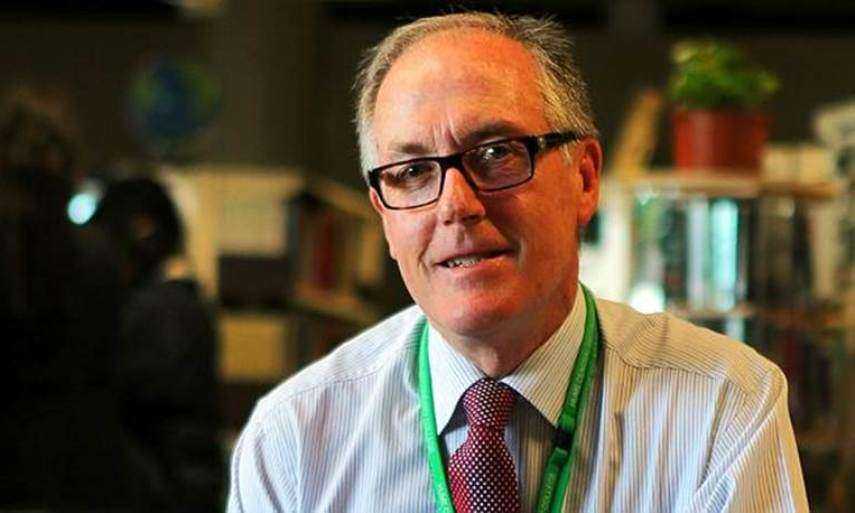- Listen to and download all the Teacher podcasts for free on iTunes and Soundcloud
Hello and welcome to the Teacher magazine podcast series on School Improvement – I'm Jo Earp.
Today we're talking to Victorian Executive Principal Glenn Proctor. In August 2008, after more than a decade as Principal of Melbourne's Mount Waverley Secondary College, he moved to the northern suburbs to take on the leadership role at Hume Central Secondary College.
Jo Earp: Glenn Proctor, welcome. Can you start first of all by telling our listeners about your own background and Hume Central Secondary College?
Glenn Proctor: ... I came from this area, which a lot of people don't know. I'm from the western suburbs, went through school in the '50s and '60s – I wasn't really impressed with it, and I think that made me want to go into education full stop. I became a teacher ... etcetera. It was really good, I enjoyed it. I've been 18 years now as a Principal and I've been six years as an Executive Principal and I've been six years obviously at Hume. [Taking this role] was to try and redress some of that disadvantage which I saw in the '50s and '60s, and I thought well, here's an opportunity to go back ... and to try and improve what was happening and increase the number of students getting through education and going on to tertiary.
JE: Now, you've got a big school improvement push there. What is the research base for the work that you're doing at Hume?
GP: ... If you're wanting to change and go through the change process I think, from my point of view, you've got to convince people how it's worked in other places (that's more important), and that ... it's not just a hit and a miss. It's been researched, this particular approach, whether it's to teaching and learning, whether it's to ... we've used Marzano for the teaching and learning, we've used Hattie in teaching and learning, particularly the explicit instruction model. We've looked to other people that would support us in the way that we were going in terms of our college and in particular we used the Vic Zbar model, which was a model and research that looked at the western suburbs. It was really around the schools that punch above their weight and it was a study that clearly showed that if you've got a low socioeconomic area, it doesn't mean that you can expect low achievements of students. And, having a research base [of] schools in the western suburbs that actually did and achieved and what we called punched above their weight - in other words they achieved outstanding results, low socioeconomic doesn't mean low achievement, it can mean high achievement - that allowed us, our staff and particularly our leadership team, to see we could put in place the practices. And, that school improvement plan or framework adopted from that research model, we've put in place and we've stuck to it. We've even used the researcher, Vic Zbar, to come out and look at our model and look at how we're going about it and comprehensively do a report card on us. ... He's been out regularly with our leadership team over the last five years, but more importantly did our college review last year in May (2013) to look at the way forward and what we needed to do to further build on our success. So his approach set out a comprehensive strategic approach to which the college improvement plan is based around and it's predicated on what we call his four conditions. So, research is very important because it allows staff to read into it and understand it and then to put it in place, particularly the leadership team.
JE: I read that you were saying it's the most difficult job that you've had. Going into that role, what was the morale like among staff there? Basically, just a bit of background, they'd been told the results weren't acceptable, hadn't they? They'd just gone through this merger involving the three schools - what was the morale like there when you arrived?
GP: I think morale was very low and they'd been in what I would call a 'holding position' for a number of years. To their credit, morale was low, but they were still holding together as a staff. Then they were asked to combine and be one staff instead of three separate schools, so morale was very low ... and no vision or direction, very low (as a result) attendance by students - it was around the 60 to 70 per cent mark. Very low achievement in terms of students going on to tertiary or getting into Year 12, you can imagine. So, all of that is a difficult situation to be in, and it does affect how you're performing. So, removing that and in the sense of building staff morale, was the first step that you needed to take. And if people have got a vision and a direction, and that's a fairly clear focus, if you've got a vision and you've got a direction then that's fairly important in that whole process. That's something that I had to set about very clearly at the very start, to build that vision and direction and ... support staff to understand that vision and direction and move towards it.
JE: But, admitting there's something seriously wrong, that can be a confronting thing. I'm interested in hearing more about the meeting you had with staff in 2009 ... where you apparently played them audio tapes of Year 9 students reading below their age level. What happened there at that meeting?
GP: It was confronting, it was the first day of the new school year; it was 2010. We were all swapping happy pics and talking about our holiday and I said 'Okay, listen to this' and it did stop everyone and it was confronting because those kids were actually reading from a newsletter I'd done about why it's important to go on to Year 12 and any successes that you have, from going on to Year 12, how important it is. Both the students were going I think into Year 10 at that stage - one was reading at Year 8 or 8.5, the other was probably Year 7. Recognising that our students had huge gaps in their learning and that if we didn't catch them up they would continue with those huge gaps at end of VCE, VET or VCAL and maybe even still if they did go on to tertiary studies, but they'd be at a major disadvantage. Getting the staff to realise that (and they were shocked by it) - the next part of it was 'What are we going to do about it?' We came up, and the leadership team prior to that meeting had come up, and I'd confronted them about it over the latter part of the previous year (2009), the next step was to come up with 'Well, what's going to be our mantra?', everything will pass by this mantra and we came up with 'Two years of learning in one for all our students'. We've been attempting to do that. We do our on-demand testing at the start of each year, half way through and the end of the year, literacy and numeracy, and our average has been one-and-a-half years of learning in one for our students over that period of time and that's shown up in our considerably improved VET, VCAL and VCE results. So it's been something that's engaged all staff - they were committed to it and working towards it but we needed something to drive it and that has been a universal agreement amongst all staff that we needed to do something about it. We did something very similar for student attendance as well. It's no use just a few people taking something up and [saying] 'We'll do something about it'. It has to be: school improvement is about change, but it's about all staff taking on that change, not just a few.
JE: Glenn Proctor, thanks for sharing your story with Teacher magazine.
GP: Great to share it with you and good luck.
To listen to more Teacher magazine podcasts and to access our articles, videos and infographics - visit www.teachermagazine.com.au, or join our community on social media via Facebook and Twitter.
- Make sure you don't miss a Teacher podcast, subscribe for free by visiting acer.ac/teacheritunes or www.soundcloud.com/teacher-ACER.
How are you identifying gaps in student learning?
What research are you using to inform your own professional practice?
What research is your school using to drive improvements in student outcomes?



